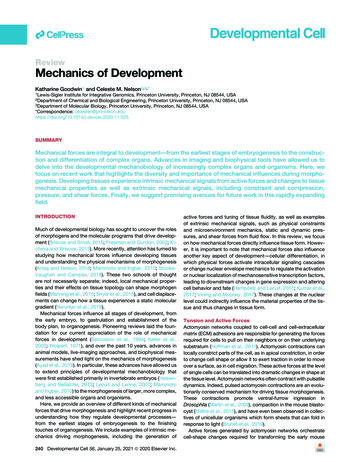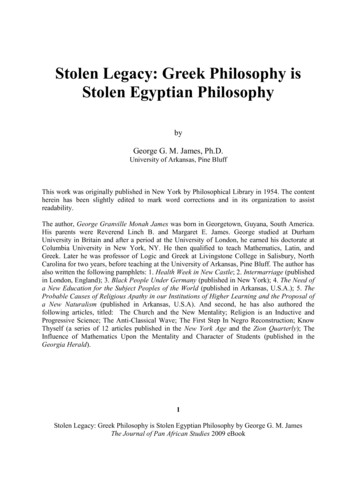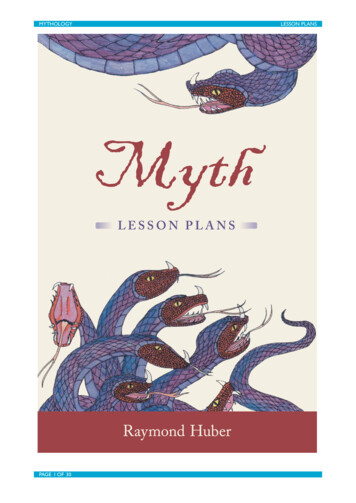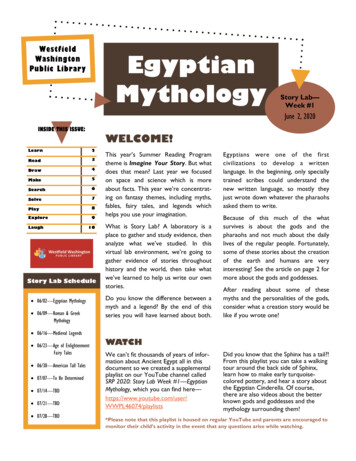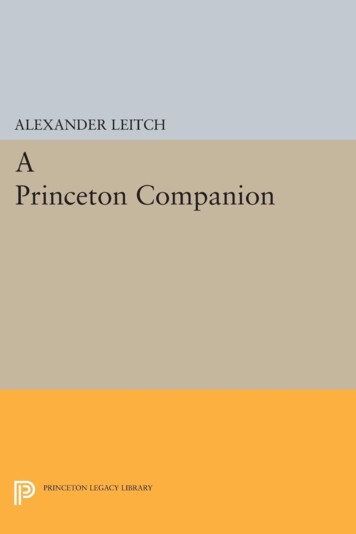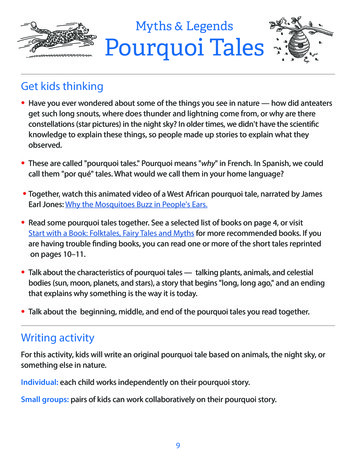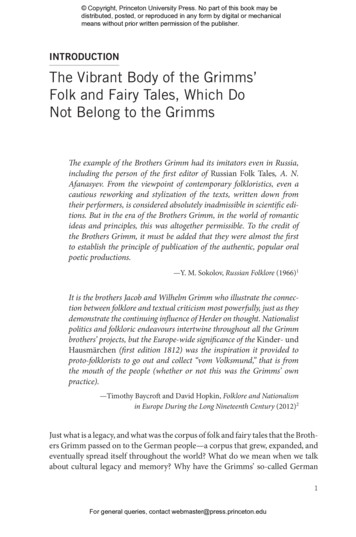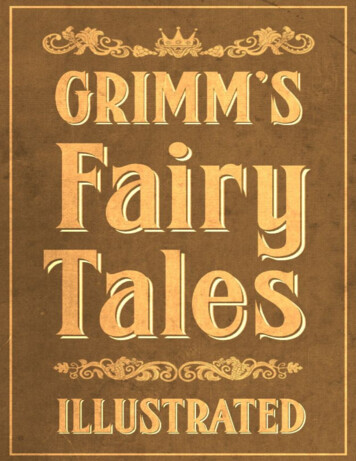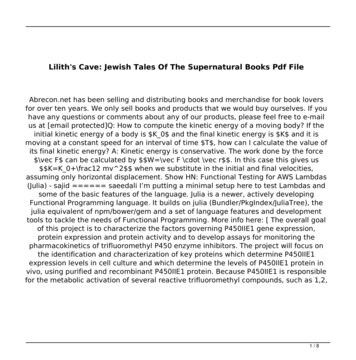
Transcription
Copyrighted Materialc ha p t e rIEgyptian Myths and TalesTranslator: John A. WilsonThe Memphite Theology of CreationWhen the First Dynasty established its capital at Memphis, it was necessaryto justify the sudden emergence of this town to central importance. TheMemphite god Ptah was therefore proclaimed to have been the First Princi ple, taking precedence over other recognized creator gods. Mythological ar guments were presented that the city of Memphis was the “place where theTwo Lands are united” and that the Temple of Ptah was the “balance inwhich Upper and Lower Egypt have been weighed.”The extracts presented here are particularly interesting, because creationis treated in an intellectual sense, whereas other creation stories (like ANET,pp. 3–4) are given in purely physical terms. Here the god Ptah conceives theelements of the universe with his mind (“heart”) and brings them into beingby his commanding speech (“tongue”). Thus, at the beginning of Egyptianhistory, there was an approach to the Logos Doctrine.The extant form of this document dates only to 700 b.c., but linguistic,philological, and geopolitical evidence is conclusive in support of its deriva tion from an original text more than two thousand years older.(53) There came into being as the heart and there came into being asthe tongue (something) in the form of Atum. The mighty Great Oneis Ptah, who transmitted [life to all gods], as well as (to) their ka’s,through this heart, by which Horus became Ptah, and through thistongue, by which Thoth became Ptah.11Ptah thought of and created by speech the creator god Atum (“Totality”), thustransmitting the divine power of Ptah to all other gods. The gods Horus and Thoth, acommonly associated pair, are equated with the organs of thought and speech.ANET,ANET, 4–5
Copyrighted Material2 Egyptian Myths and TalesFig.Fig. 158Gen.Gen. 2:2(Thus) it happened that the heart and tongue gained control over[every] (other) member of the body, by teaching that he2 is in everybody and in every mouth of all gods, all men, [all] cattle, all creepingthings, and (everything) that lives, by thinking and commanding ev erything that he wishes.(55) His Ennead is before him in (the form of) teeth and lips. Thatis (the equivalent of) the semen and hands of Atum. Whereas theEnnead of Atum came into being by his semen and his fingers, theEnnead (of Ptah), however, is the teeth and lips in this mouth, whichpronounced the name of everything, from which Shu and Tefnutcame forth, and which was the fashioner of the Ennead.The sight of the eyes, the hearing of the ears, and the smelling theair by the nose, they report to the heart. It is this which causes everycompleted (concept) to come forth, and it is the tongue which an nounces what the heart thinks.Thus all the gods were formed and his Ennead was completed.Indeed, all the divine order really came into being through what theheart thought and the tongue commanded. Thus the ka spirits weremade and the hemsut spirits were appointed, they who make all pro visions and all nourishment, by this speech. (Thus justice was givento) him who does what is liked, (and injustice to) him who does whatis disliked. Thus life was given to him who has peace and death wasgiven to him who has sin. Thus were made all work and all crafts, theaction of the arms, the movement of the legs, and the activity ofevery member, in conformance with (this) command which theheart thought, which came forth through the tongue, and whichgives value to everything.(Thus) it happened that it was said of Ptah: “He who made all andbrought the gods into being.” He is indeed Ta tenen, who broughtforth the gods, for everything came forth from him, nourishmentand provisions, the offerings of the gods, and every good thing. Thusit was discovered and understood that his strength is greater than(that of the other) gods. And so Ptah was satisfied,3 after he had madeeverything, as well as all the divine order. He had formed the gods, hehad made cities, he had founded nomes, he had put the gods in theirshrines, (60) he had established their offerings, he had founded theirshrines, he had made their bodies like that (with which) their heartswere satisfied. So the gods entered into their bodies of every (kindof) wood, of every (kind of) stone, of every (kind of) clay, or any thing which might grow upon him,4 in which they had taken form.2Ptah, as heart and tongue.Or, “so Ptah rested.”4 Upon Ptah, in his form of the “rising land.” Note that divine images were not thegods themselves, but only places.3
Copyrighted MaterialDeliverance of Mankind from Destruction So all the gods, as well as their ka’s gathered themselves to him, con tent and associated with the Lord of the Two Lands.Deliverance of Mankind from DestructionThe themes of this myth are the sin of mankind, the destructive disappoint ment of their creator, and the deliverance of mankind from annihilation.However, the setting of the present text shows that its purpose was magicalprotection rather than moral teaching. On the walls of three royal tombs ofthe Empire, it accompanies certain charms to protect the body of the deadruler. This implies that the former deliverance of mankind from destructionwill be valid also in this individual case.It happened that . . . Re, the god who came into being by himself,when he was king of men and gods all together. Then mankind plot ted something in the (very) presence of Re. Now then, his majesty—life, prosperity, health!—was old. His bones were of silver, his flesh ofgold, and his hair of genuine lapis lazuli.Then his majesty perceived the things which were being plottedagainst him by mankind. Then his majesty—life, prosperity, health!—said to those who were in his retinue: “Pray, summon to me my Eye,5Shu, Tefnut, Geb, and Nut, as well as the fathers and mothers whowere with me when I was in Nun,6 as well as my god Nun also. He isto bring his court (5) with him. Thou shalt bring them secretly: let notmankind see; let not their hearts escape.7 Thou shalt come with themto the Great House, that they may tell their plans, since the [times]when I came from Nun to the place in which I came into being.”Then these gods were brought in, and these gods [came] besidehim, putting their heads to the ground in the presence of his majesty,so that he might make his statement in the presence of the father ofthe eldest, he who made mankind, the king of people. Then they saidin the presence of his majesty: “Speak to us, so that we may hear it.”Then Re said to Nun: “O eldest god, in whom I came into being,O ancestor gods, behold mankind, which came into being from myEye8—they have plotted things against me. Tell me what ye would doabout it. Behold, I am seeking; I would not slay them until I hadheard what (10) ye might say about it.” Then the majesty of Nun said:“My son Re, the god greater than he who made him and mightierthan they who created him, sitting upon thy throne, the fear of thee5 The eye of the sun god was an ìndependent part of himself, with a complicatedmythological history.6 The abysmal waters, in which creation took place.7 Was Re unwilling that mankind repent its rebellious purposes?8 Mankind originated as the tears of the creator god.ANETANET,, 10–11Gen.Gen. 6:5–7Fig. 158Fig3
Copyrighted Material4 Egyptian Myths and TalesFig.Fig. 162is great when thy Eye is (directed) against them who scheme againstthee!” Then the majesty of Re said: “Behold, they have fled into thedesert, their hearts being afraid because I might speak to them.” Thenthey said in the presence of his majesty: “May thy Eye be sent, that itmay catch for thee them who scheme with evil things. (But) the Eyeis not (sufficiently) prominent therein to smite them for thee. Itshould go down as Hat Hor.”So then this goddess came and slew mankind in the desert. Thenthe majesty of this god said: “Welcome, Hat Hor, who hast done forme the deed for which I came!” Then this goddess said: “As thou livestfor me, I have prevailed over mankind, and it is pleasant in my heart!”Then the majesty of Re said: “I shall prevail over them as a king (15) bydiminishing them!”9 That is how Sekhmet came into being, the (beer) mash of the night, to wade in their blood from Herakleopolis.10Then Re said: “Pray, summon to me swift and speedy messengers,so that they may run like the shadow of a body.” Then these messen gers were brought immediately. Then the majesty of this god said:“Go ye to Elephantine and bring me red ochre very abundantly.”Then this red ochre was brought to him. Then the majesty of thisgreat god caused . . . , [and He With] the Side Lock who is in He liopolis11 ground up this red ochre. When further maidservantscrushed barley to (make) beer, then this red ochre was added to thismash. Then (it) was like human blood. Then seven thousand jars ofthe beer were made. So then the majesty of the King of Upper andLower Egypt: Re came, together with these gods, to see this beer.Now when day broke for (20) the slaying of mankind by the god dess at their season of going upstream, then the majesty of Re said:“How good it is! I shall protect mankind with it!” Then Re said: “Pray,carry it to the place in which she expected to slay mankind.” Thenthe majesty of the King of Upper and Lower Egypt: Re went to workearly in the depth of the night to have this sleep maker poured out.Then the fields were filled with liquid for three palms, through thepower of the majesty of this god.Then this goddess went at dawn, and she found this (place)flooded. Then her face (looked) beautiful therein. Then she drank,and it was good in her heart. She came (back) drunken, without hav ing perceived mankind.(The remainder of this story has to do with the origin of certainnames and customs, such as the use of strong drink at the Feast ofHat Hor.)9 It soon becomes clear that Re wishes the destruction to cease, whereas Hat Horis unwilling to halt her lustful annihilation.10 The formula by which the origin of a name was explained.11 An epithet of the High Priest of Re.
Copyrighted MaterialThe Story of Si nuhe The Story of Si nuheANETANET,, 18–22A strong love of country was a dominant characteristic of the ancient Egyp tian. Though he might feel the responsibilities of empire building, he wishedthe assurance that he would close his days on the banks of the Nile. Thatsentiment made the following story one of the most popular classics ofEgyptian literature. An Egyptian official of the Middle Kingdom went intovoluntary exile in Asia. He was prosperous and well established there, but hecontinued to long for the land of his birth. Finally he received a royal invita tion to return and join the court. This was his real success in life, and thiswas the popular point of the story. Much of the tale is pompous and over styled in wording and phrasing, but the central narrative is a credible ac count, which fits the period as we know it. If this was fiction, it was based onrealities and deserves a respected place in Egyptian literature.The story opens with the death of Amen em het I (about 1960 b.c.) andcontinues in the reign of his successor, Sen Usert I (about 1971–1928 b.c.).Manuscripts are plentiful and run from the late Twelfth Dynasty (about1800 b.c.) to the Twenty first Dynasty (about 1000 b.c.). There are five papyriand at least seventeen ostraca. The most important papyri are in Berlin.(R1) The Hereditary Prince and Count, Judge and DistrictOverseer of the domains of the Sovereign in the lands of the Asiatics,real acquaintance of the king, his beloved, the Attendant Si nuhe. Hesays:I was an attendant who followed his lord, a servant of the royalharem (and of) the Hereditary Princess, the great of favor, the wife ofKing Sen Usert in (the pyramid town) Khenem sut, the daughter ofKing Amen em het (R5) in (the pyramid town) Qa nefru, Nefru,the lady of reverence.Year 30, third month of the first season, day 7.12 The godascended to his horizon; the King of Upper and Lower Egypt:Sehetep ib Re was taken up to heaven and united with the sun disc.The body of the god merged with him who made him.13 The Resi dence City was in silence, hearts were in mourning, the GreatDouble Doors were sealed shut. (R10) The courtiers (sat) head onlap, and the people were in grief.Now his majesty had sent an army to the land of the Temeh Libyans, with his eldest son as the commander thereof, the good godSen Usert, (R15) and even now he was returning and had carried offliving captives of the Tehenu Libyans and all (kinds of) cattle with out number.12Around 1960 Amen em het I’s death would have fallen early in March.The pharaoh was the “Son of Re,” the sun god. At death he was taken back intothe body of his creator and father.13Fig. 105Fig5
Copyrighted Material6 Egyptian Myths and TalesThe courtiers of the palace sent to the western border to let theKing’s Son know the events which had taken place at the court. Themessengers met him on the road, (R20) and they reached him inthe evening time. He did not delay a moment; the falcon14 flew awaywith his attendants, without letting his army know it. Now the royalchildren who had been following him in this army had been sent for,(B1) and one of them was summoned. While I was standing (nearby) I heard his voice as he was speaking and I was a little way off. Myheart was distraught, my arms spread out (in dismay), trembling fellupon all my limbs.15 I removed myself by leaps and bounds to seek ahiding place for myself. I placed (5) myself between two bushes, inorder to cut (myself) off from the road and its travel.I set out southward, (but) I did not plan to reach this ResidenceCity, (for) I thought that there would be civil disorder, and I did notexpect to live after him. I crossed Lake Ma‘aty near Sycamore, and Icame to Snefru Island. I spent the day there on the edge of (10) thefields, I came into the open light, while it was (still) day, and I met aman standing near by. He stood in awe of me, for he was afraid.When the time of the evening meal came, I drew near to Ox town. Icrossed over in a barge without a rudder, by aid of the west wind. Ipassed by the east of the quarry (15) above Mistress of the Red Mountain.16 I gave (free) road to my feet going northward, and Icame up to the Wall of the Ruler, made to oppose the Asiatics andto crush the Sand Crossers. I took a crouching position in a bush, forfear lest the watchmen upon the wall where their day’s (duty) wasmight see me.I set out (20) at evening time, and when day broke I reachedPeten. I halted at the Island of Kem wer. An attack of thirst overtookme. I was parched, and my throat was dusty. I said: “This is the tasteof death!” (But then) I lifted up my heart and collected myself, for Ihad heard the sound of the lowing of cattle, (25) and I spied Asiatics.The sheikh among them, who had been in Egypt, recognized me.Then he gave me water while he boiled milk for me. I went with himto his tribe. What they did (for me) was good.One foreign country gave me to another. I set off for Byblos andapproached Qedem, and spent (30) a year and a half there. Ammi enshi—he was a ruler of Upper Retenu—took me and said to me:14The new king Sen Usert I.We are never directly told the reason for Si nuhe’s sudden fright and voluntaryexile. Later both he and the king protest his innocence. He may have been legallyguiltless, but the transition between kings was a dangerous time for one who was notfully identified with the new king. Assume that Si nuhe had adequate reason for hissudden and furtive departure and his long stay in Asia.16 Gebel el Ahmar, east of Cairo.15
Copyrighted MaterialThe Story of Si nuhe “Thou wilt do well with me, and thou wilt hear the speech of Egypt.”He said this, for he knew my character, he had heard of my wisdom,and the people of Egypt who were there with him17 had borne wit ness for me. . . .He set me at the head of his children. He married me to his eldestdaughter. He let me choose for myself of his country, (80) of thechoicest of that which was with him on his frontier with anothercountry. It was a good land, named Yaa. Figs were in it, and grapes.It had more wine than water. Plentiful was its honey, abundant its ol ives. Every (kind of) fruit was on its trees. Barley was there, andemmer. There was no limit to any (kind of) cattle. (85) Moreover,great was that which accrued to me as a result of the love of me. Hemade me ruler of a tribe of the choicest of his country. Bread wasmade for me as daily fare, wine as daily provision, cooked meat androast fowl, beside the wild beasts of the desert, for they hunted (90)for me and laid before me, beside the catch of my (own) hounds.Many . . . were made for me, and milk in every (kind of) cooking.I spent many years, and my children grew up to be strong men,each man as the restrainer of his (own) tribe. The messenger whowent north or who went south to the Residence City (95) stoppedover with me, (for) I used to make everybody stop over. I gave waterto the thirsty. I put him who had strayed (back) on the road. I res cued him who had been robbed. When the Asiatics became so boldas to oppose the rulers of foreign countries, I counseled their move ments. This ruler of (100) (Re)tenu had me spend many years ascommander of his army. Every foreign country against which I wentforth, when I had made my attack on it, was driven away from itspasturage and its wells. I plundered its cattle, carried off its inhabi tants, took away their food, and slew people in it (105) by my strongarm, by my bow, by my movements, and by my successful plans. Ifound favor in his heart, he loved me, he recognized my valor, and heplaced me at the head of his children, when he saw how my armsflourished.A mighty man of Retenu came, that he might challenge me (110)in my (own) camp. He was a hero without his peer, and he had re pelled all of it.18 He said that he would fight me, he intended to de spoil me, and he planned to plunder my cattle, on the advice of histribe. That prince discussed (it) with me, and I said: “I do not knowhim. Certainly I am no confederate of his, (115) so that I might movefreely in his encampment. Is it the case that I have (ever) opened hisdoor or overthrown his fences? (Rather), it is hostility because hesees me carrying out thy commissions. I am really like a stray bull1718Other exiles like Si nuhe? He is in a land of refuge from Egypt.He had beaten every one of the land of Retenu.Num. 13:23, 277
Copyrighted Material8 Egyptian Myths and TalesI Sam.Sam. 17:51in the midst of another herd, and a bull of (these) cattle attackshim. . . . ”19During the night I strung my bow and shot my arrows,20 I gavefree play to my dagger, and polished my weapons. When day broke,(Re)tenu was come. (130) It had whipped up its tribes and collectedthe countries of a (good) half of it. It had thought (only) of this fight.Then he came to me as I was waiting, (for) I had placed myself nearhim. Every heart burned for me; women and men groaned. Everyheart was sick for me. They said: “Is there another strong man whocould fight against him?” Then (he took) his shield, his battle axe,(135) and his armful of javelins. Now after I had let his weapons issueforth, I made his arrows pass by me uselessly, one close to another.He charged me, and I shot him, my arrow sticking in his neck. Hecried out and fell on his nose. (140) I felled him with his (own) bat tle axe and raised my cry of victory over his back, while every Asiaticroared. I gave praise to Montu,21 while his adherents were mourningfor him. This ruler Ammi enshi took me into his embrace. Then Icarried off his goods and plundered his cattle. What he had plannedto do (145) to me I did to him. I took what was in his tent andstripped his encampment. I became great thereby, I became exten sive in my wealth, I became abundant in my cattle.Thus did god to show mercy to him upon whom he had laidblame, whom he had led astray to another country. (But) today hisheart is assuaged.22 . . .Now when the majesty of the King of Upper and Lower Egypt:Kheper ka Re, the justified,23 was told about this situation in whichI was, then his majesty kept sending (175) to me with presentationsfrom the royal presence, that he might gladden the heart of this ser vant like the ruler of any foreign country. The royal children in hispalace let me hear their commissions.24 . . .Then they came for this servant. . . . I was permitted to spend aday in Yaa handing over my property to my children, my eldest sonbeing responsible for my tribe. (240) My tribe and all my propertywere in his charge: my serfs, all my cattle, my fruit, and every pleas ant tree of mine.19 Si nuhe goes on to state that he accepts the challenge, which has come to himbecause he is an outsider.20 In practice.21 The Egyptian god of war.22 It is not clear how Si nuhe expiated his sins, except by being a successful Egyp tian in another country.23 Sen Usert I.24 They also wrote to Si nuhe.
Copyrighted MaterialThe Story of Si nuhe Then this servant came southward. I halted at the “Ways ofHorus.”25 The commander there who was responsible for the patrolsent a message to the Residence to make (it) known. Then his maj esty sent a capable overseer of peasants of the palace, with loadedships in his train, (245) carrying presentations from the royal pres ence for the Asiatics who had followed me, escorting me tothe “Ways of Horus.” I called each of them by his name.26 Everybutler was (busy) at his duties. When I started and set sail, the knead ing and straining (of beer) was carried on beside me, until I hadreached the town of Lisht.When day had broken, very early, they came and summoned me,ten men coming and ten men going to usher me to the palace. I putmy brow to the ground between the sphinxes, (250) while the royalchildren were waiting in a recess to meet me. The courtiers who usherinto the audience hall set me on the way to the private chambers. Ifound his majesty upon the Great Throne in a recess of fine gold.When I was stretched out upon my belly, I knew not myself in hispresence, (although) this god greeted me pleasantly. I was like a mancaught in the dark: (255) my soul departed, my body was powerless,my heart was not in my body, that I might know life from death.Then his majesty said to one of these courtiers: “Lift himup. Let him speak to me.” Then his majesty said: “Behold, thou artcome. Thou hast trodden the foreign countries and made a flight.(But now) elderliness has attacked thee; thou hast reached old age. Itis no small matter that thy corpse be (properly) buried; thou shouldstnot be interred by bowmen. Do not, do not act thus any longer: (for)thou dost not speak (260) when thy name is pronounced!” Yet (I)was afraid to respond, and I answered it with the answer of oneafraid: “What is it that my lord says to me? I should answer it, (but)there is nothing that I can do: it is really the hand of a god. It is a ter ror that is in my belly like that which produced the fated flight. Be hold, I am before thee. Thine is life. May thy majesty do ashe pleases.”Thereupon the royal children were ushered in. Then his majestysaid to the Queen: “Here is Si nuhe, (265) come as a Bedu, (in) theguise of the Asiatics.” She gave a very great cry, and the royal childrenclamored all together. Then they said to his majesty: “It is not reallyhe, O Sovereign, my lord!” Then his majesty said: “It is really he!”Now when they had brought with them their bead necklaces, theirrattles, and their sistra, then they presented them to his majesty.“. . . Loose the horn of thy bow and relax thy arrow! (275) Give breath2526The Egyptian frontier station facing Sinai, probably near modern Kantarah.He introduced the Asiatics to the Egyptians.Gen.Gen. 45:21–23ExoExod. 15:20–219
Copyrighted Material10 Egyptian Myths and TalesGeGen.n. 41:42GeGen.n. 41:14Fig.Fig. 192to him that was stifled! Give us our goodly gift in this sheikh Si Mehit, a bowman born in Egypt. He made a flight through fear ofthee; he left the land through terror of thee. (But) the face of himwho beholds thy face shall not blench; the eye which looks at theeshall not be afraid!”Then his majesty said: “He shall not fear. (280) He has no title tobe in dread. He shall be a courtier among the nobles. He shall be putin the ranks of the courtiers. Proceed ye to the inner chambers of themorning (toilet), in order to make his position.”27So I went forth from the midst of the inner chambers, with theroyal children giving me their hands. (285) Thereafter we went to theGreat Double Door. I was put into the house of a royal son, in whichwere splendid things. A cool room was in it, and images of the hori zon.28 Costly things of the Treasury were in it. Clothing of royallinen, myrrh, and prime oil of the king and of the nobles whom heloves were in every room. (290) Every butler was (busy) at his duties.Years were made to pass away from my body. I was plucked, and myhair was combed. A load (of dirt) was given to the desert, and myclothes (to) the Sand Crossers. I was clad in fine linen and anointedwith prime oil. I slept on a bed. I gave up the sand to them who arein it, (295) and wood oil to him who is anointed with it. I was givena house which had a garden, which had been in the possession of acourtier. Many craftsmen built it, and all its wood(work) was newlyrestored. Meals were brought to me from the palace three or fourtimes a day, apart from that which the royal children gave, withoutceasing a moment.(300) There was constructed for me a pyramid tomb of stone inthe midst of the pyramid tombs. The stone masons who hew a pyra mid tomb took over its ground area. The outline draftsmen designedin it; the chief sculptors carved in it; and the overseers of works whoare in the necropolis made it their concern. (305) Its necessary mate rials were made from all the outfittings which are placed at a tomb shaft. Mortuary priests were given to me. There was made for me anecropolis garden, with fields in it formerly (extending) as far as thetown, like that which is done for a chief courtier. My statue was over laid with gold, and its skirt was of fine gold. It was his majesty whohad it made. There is no poor man for whom the like has been done.(So) I was under (310) the favor of the king’s presence until theday of mooring had come.2927 Si nuhe’s new rank is to be established by a change of dress in a properly desig nated place.28 Painted decorations. “Cool room” may have been either a bathroom or a cellarfor preserving foods.29 Until the day of death.
Copyrighted MaterialThe Story of Two Brothers The Story of Two BrothersThis folk tale tells how a conscientious young man was falsely accused of a pro posal of adultery by the wife of his elder brother, after he had actually rejectedher advances. This part of the story has general similarity to the story of Josephand Potiphar’s wife. The two chief characters are brothers named Anubis andBata. These were the names of Egyptian gods, and the tale probably does havea mythological setting. However, it served for entertainment, rather than eccle siastical or moral purpose. The story is colloquial and is so translated.Papyrus D’Orbiney is now British Museum 10183. Facsimiled in SelectPapyri in the Hieratic Character from the Collections of the British Museum,11 (London, 1860), Pls. ix–xix, and in G. Möller, Hieratische Lesestücke, 11(Leipzig, 1927), 1–20. The manuscript can be closely dated to about 1225 b.c.in the Nineteenth Dynasty. Transcription into hieroglyphic in A. H. Gar diner, Late Egyptian Stories (Bibliotheca Aegyptiaca, 1, Brussels, 1932), 9–29,Translation in Erman, LAE, 150–61.Now they say that (once) there were two brothers of onemother and one father. Anubis was the name of the elder, and Batawas the name of the younger. Now, as for Anubis, he [had] a houseand had a wife, [and] his younger brother (lived) with him as a sortof minor. He was the one who made clothes for him and went to thefields driving his cattle. He was the one who did the plowing andwho harvested for him. He was the one who did all (kinds of) workfor him which are in the fields. Really, his younger [brother] was agood (grown) man. There was no one like him in the entire land.Why, the strength of a god was in him.[Now] after many days after this,30 his younger brother (5)[was tending] his cattle in his custom of every [day], and he [left off](to go) to his house every evening, loaded [with] all (kinds of) plantsof the field, [with] milk, with wood, and [with] every [good thing of]the fields, and he laid them in front of his [elder brother], who wassitting with his wife. And he drank and he ate, and [he went out tosleep in] his stable among his cattle [by himself ].Now when it was dawn and a second day had come, [he pre pared food], which was cooked, and laid it before his elder brother.[And he] gave him bread for the fields. And he drove his cattle out tolet them feed in the fields. He went along after his cattle, [and] theywould say to him: “The grass [of] such and such a place is good,”and he would understand whatever they said and would take themto the place (ii 1) of good grass which they wanted. So the cattlewhich were before him became very, very fine. They doubled theircalving very, very much.30The unthinking formula of a storyteller making a transition.ANETANET,, 23–25Gen.Gen. 39:1–2011
Copyrighted Material12 Egyptian Myths and TalesFig.Fig. 16Fig.Fig. 10Now at the time of plowing his [elder] brother said to him:“Get a yoke [of oxen] ready for us for plowing, for the fields havecome out, and it is fine for plowing. Also come to the fields withseed, for we shall be busy (with) plowing [in] the morning.” So hespoke to him. Then [his] (5) younger brother did all the things whichhis elder brother had told him to [do].Now when it was dawn [and a second] day had come, theywent to the fields with their [seed], and they were busy [with] plow ing, and [their hearts] were very, very pleased with the
the majesty of the King of Upper and Lower Egypt: Re went to work early in the depth of the night to have this sleep maker poured out. hen the ields were illed with liquid for three palms, through the power of the majesty of this god. hen this goddess went at dawn, and she found this (place) looded. hen her face (looked) beautiful therein. hen .
